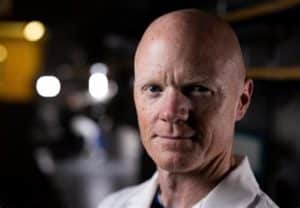STEM-Talk: “Why We Get Sick” author Ben Bikman on insulin resistance and metabolic health
Published 10.13.22
The STEM-Talk interview with the author of “Why We Get Sick” is now available on podcast apps and IHMC’s website. Dr. Ben Bikman is a biomedical scientist at Brigham Young University who is known for his research into the role of insulin and ketones as key drivers of metabolic function.
In “Why We Get Sick,” Bikman takes a deep dive into insulin resistance and metabolic health. In his STEM-Talk interview, Bikman discusses his books as well as his extensive research that links many of today’s major diseases, including cancer, diabetes, and Alzheimer’s disease, to insulin resistance.

Dr. Ben Bikman, author of “Why We Get Sick.”
STEM-Talk cohosts Drs. Ken Ford and Dawn Kernagis talk with Bikman about how around the world people are struggling with diseases that were once considered rare. Today, cancer, heart disease, Alzheimer’s disease, and diabetes affect millions each year.
A growing number of people in the U.S. are struggling with hypertension, obesity, fatty liver, dementia, low testosterone, menstrual irregularities, and infertility as well as a host of other disorders. Bikman identifies insulin resistance as one of the root causes behind all of these.
Ben and his colleagues at the Bikman Lab investigate the molecular mechanisms behind the increased risks of disease that accompany obesity and excess visceral fat. The Bikman Lab focuses on the etiology of insulin resistance and how it disrupts mitochondrial function.
In Bikman’s STEM-Talk interview, cohosts Ford and Kernagis talk to Bikman about:
- How insulin resistance is tied to multiple chronic diseases.
- The relevance of ketones in mitochondrial function.
- How so many of our modern chronic diseases are self-inflicted and driven by insulin resistance.
- How more than half of the people in the U.S. are insulin resistant.
- How many of the hallmarks of aging are a consequence of insulin resistance.
- The theory that the longest-lived people are likely the most insulin sensitive.
- The benefits that occur with carbohydrate reduction as a result of increasing insulin sensitivity.
- Ben’s thoughts about the degree of intermittent fasting needed to induce autophagy in humans.
STEM-Talk is a podcast that is part of IHMC’s outreach initiatives. IHMC is a not-for-profit research institute of the Florida University System where researchers pioneer science and technologies aimed at leveraging and extending human capabilities. For more information, visit ihmc.us.
Latest News
- STEM-Talk: Francisco Gonzalez-Lima on methylene blue and noninvasive brain stimulation
- STEM-Talk: Judith Curry and the Consequences of Climate Alarmism
- STEM-Talk: NASA’s Flawed Plan to Return to the Moon – with Mike Griffin and Lisa Porter
- IHMC partners with Conduit Venture Labs to accelerate commercialization efforts
- Research platforms aim to better support military personnel in high-stress environments
- Study for U.S. Air Force Research Lab tracks impact of ketones on pilot ventilation
- National Institute on Aging funded study tracks changes to gait as we age
- Meet Alex, IHMC’s next generation humanoid robot
- Decades of AI-expertise fuel growth of National Center for Collaborative Autonomy

